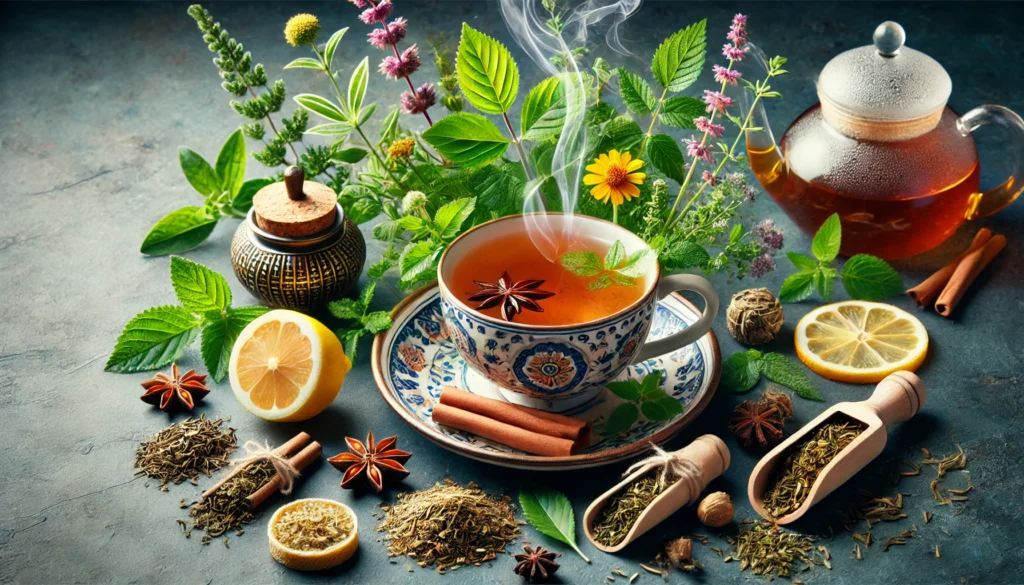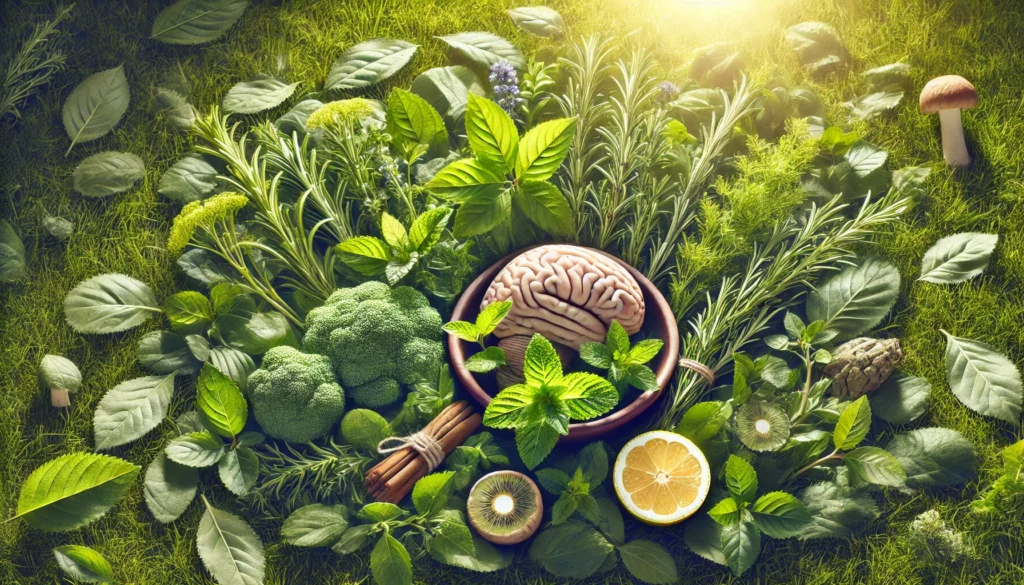Feeling mentally sluggish or experiencing difficulty concentrating is often described as “brain fog.” While it’s not a medical term, brain fog is a common complaint that can be a symptom of various underlying conditions, including stress, fatigue, and poor diet. Fortunately, nature offers several herbs that have shown promise in alleviating brain fog and enhancing cognitive function. In this article, we delve into the top herbs for brain fog, providing insights into their historical usage, scientific backing, and practical applications.
You may also like: Top Herbs to Enhance Your Focus
The Science Behind Brain Fog
Brain fog can manifest as forgetfulness, mental fatigue, confusion, and a lack of focus. While it might not be recognized as a clinical condition, it can significantly impact daily life. The causes of brain fog can range from lifestyle factors such as sleep deprivation and diet to medical conditions like hypothyroidism or chronic fatigue syndrome.
Manifestations of Brain Fog
Brain fog is more than just forgetfulness. Individuals often report a profound sense of mental fatigue, as if their thoughts are moving through molasses. Everyday tasks become challenging, and decision-making feels overwhelming. This cognitive haze can affect professional performance and personal relationships, making it crucial to address.
Lifestyle and Environmental Factors
Modern lifestyles contribute significantly to brain fog. Chronic stress from work or personal life can lead to hormonal imbalances affecting brain function. Poor dietary habits, such as excessive consumption of processed foods, deprive the brain of essential nutrients. Additionally, environmental pollutants and toxins can exacerbate cognitive impairments.
Medical Conditions Linked to Brain Fog
Several medical conditions can lead to brain fog. Chronic illnesses such as fibromyalgia, autoimmune diseases, and depression often list cognitive dysfunction as a symptom. Hormonal imbalances, particularly in thyroid disorders, can also contribute to mental cloudiness. Understanding these links is vital for effective management and treatment.
The Role of Natural Remedies
While understanding the underlying causes is crucial, exploring natural remedies, such as herbs, is equally important. These remedies have been utilized for centuries to promote mental clarity. They offer a holistic approach, addressing not just symptoms but also underlying imbalances, bringing the body and mind back into harmony.
Best Herbs for Brain Fog
Discovering the best herbs for brain fog involves exploring both ancient wisdom and modern science. These herbs have stood the test of time, valued for their ability to enhance cognitive function and alleviate mental fatigue.
Ginkgo Biloba
Ginkgo biloba is one of the oldest living tree species and has been used in traditional medicine for thousands of years. This herb is renowned for its potential to enhance cognitive function by improving blood circulation to the brain and acting as an antioxidant.
Historical Usage and Cultural Significance
Ginkgo biloba has roots in ancient Chinese medicine, where it was revered for its ability to support brain health and vitality. It was often used to treat ailments related to aging, such as memory loss and vertigo. Its leaves were brewed into teas, consumed to enhance longevity and mental acuity.
Scientific Evidence and Modern Research
Modern research supports the traditional uses of Ginkgo biloba. Studies have shown that it can improve cognitive function, particularly in older adults and those experiencing cognitive decline. Its antioxidant properties help combat oxidative stress, a key factor in neurodegenerative diseases, providing a protective shield for brain cells.
Practical Usage and Dosage Recommendations
Ginkgo biloba is available in various forms, including capsules, tablets, and teas. To address brain fog, a typical dosage is between 120-240 mg per day, divided into two or three doses. It’s important to choose standardized extracts to ensure consistent potency and effectiveness.
Bacopa Monnieri
Bacopa monnieri, also known as Brahmi, is a staple in Ayurvedic medicine, known for its memory-enhancing properties. It is believed to support cognitive function by reducing anxiety and improving memory retention.

Historical Context and Ayurvedic Roots
Bacopa monnieri has been used for centuries in Ayurvedic medicine, where it is regarded as a powerful brain tonic. Traditionally, it was used by scholars to enhance learning and memory. This herb is believed to balance the mind, promoting clarity and concentration.
Evidence from Scientific Studies
Studies have indicated that bacopa monnieri can improve memory recall and cognitive processing. Researchers suggest that it enhances communication between neurons and offers neuroprotective effects, safeguarding the brain from age-related damage. Its ability to reduce anxiety further supports cognitive performance by calming the mind.
How to Incorporate Bacopa into Your Routine
Bacopa monnieri is commonly consumed in capsule or powder form. For cognitive enhancement, a standard dosage is between 300-600 mg per day. Consistency is key, as the benefits of Bacopa often become more pronounced with prolonged use, typically over several weeks.
Rhodiola Rosea
Rhodiola rosea is an adaptogenic herb that has been traditionally used in Russian and Scandinavian countries to combat fatigue and improve mental performance. Its ability to reduce stress and enhance mood makes it a powerful ally against brain fog.
Traditional Uses in Cold Climates
Rhodiola rosea thrives in harsh, cold climates and has been used by indigenous populations to enhance stamina and resilience. It was traditionally consumed to combat the physical and mental challenges posed by long winters and demanding environments, often taken as a tonic to sustain energy.
Scientific Validation of Benefits
Research has shown that rhodiola rosea can reduce symptoms of fatigue and improve mental performance under stress. Its adaptogenic properties enable the body to resist physical, chemical, and environmental stressors, enhancing overall resilience and mental clarity.
Recommended Forms and Dosage
Rhodiola is often taken as an extract, with a common dosage ranging from 200-600 mg per day, depending on the concentration of active compounds. It’s advisable to start with a lower dose and gradually increase, allowing the body to adjust to its effects.
Lesser-Known Herbs with Potential
While the aforementioned herbs are well-known, other lesser-known herbs hold great promise for alleviating brain fog and supporting cognitive health.
Gotu Kola
Gotu kola, known as the “herb of longevity,” is another Ayurvedic staple believed to enhance memory and concentration. It improves circulation and has calming properties that can alleviate stress-related brain fog.
Traditional Applications in Ayurveda
Gotu kola has been used in Ayurveda for centuries to enhance cognitive function and promote longevity. It is often included in herbal formulations designed to balance the mind and body, supporting meditation and mental clarity.
Emerging Scientific Insights
Preliminary studies suggest that gotu kola can enhance cognitive function and reduce anxiety. However, more research is needed to fully understand its mechanisms. Current findings indicate its potential to improve circulation and protect brain cells from damage.
Practical Usage Tips
Typically consumed as a tea or in capsule form, a standard dose ranges from 500-1000 mg per day. It’s often recommended to pair gotu kola with a mindfulness practice, such as meditation or yoga, to maximize its calming effects.
Lion’s Mane Mushroom
Lion’s mane mushroom, although not an herb in the traditional sense, is gaining popularity for its neuroprotective properties. It is thought to stimulate the production of nerve growth factor (NGF), which supports the growth and differentiation of neurons.
Historical and Culinary Uses
Lion’s mane has been consumed in Asian cultures for centuries, both as a culinary delicacy and a medicinal mushroom. Its unique appearance and savory flavor make it a popular choice in gourmet dishes, while its health benefits are celebrated in traditional medicine.
Scientific Findings and Potential
Animal studies have shown that lion’s mane can promote nerve regeneration and improve cognitive function. Human studies are limited but promising, suggesting potential benefits for individuals experiencing cognitive decline or neurological disorders.

Incorporating Lion’s Mane into Your Diet
Lion’s mane is available in supplement form, with a typical dosage of 500-3000 mg per day, depending on the product’s concentration. It can also be consumed as part of a balanced diet, adding both nutritional value and potential cognitive benefits.
Integrating Herbs into Your Routine
When considering herbs for brain fog, it’s essential to approach them as part of a holistic lifestyle change. Here are some tips to maximize their benefits:
Consult a Healthcare Provider
Before starting any new supplement, consult with a healthcare professional, especially if you have existing health conditions or are taking medications. A healthcare provider can offer personalized advice, ensuring that the chosen herbs align with your overall health strategy.
Combine with Healthy Habits
Ensure you maintain a balanced diet, regular exercise, and sufficient sleep to support cognitive health. Herbs work best when integrated into a lifestyle that promotes overall wellness. Consider incorporating practices such as mindfulness, yoga, or tai chi to enhance mental clarity.
Monitor Effects and Adjust Accordingly
Pay attention to how your body responds to each herb, and adjust dosages as needed. Keeping a journal can help track changes in cognitive function, mood, and energy levels. This practice allows for informed adjustments, optimizing the benefits of each herb.
Future Implications and Considerations
The use of herbs for cognitive enhancement is a promising field that blends traditional wisdom with modern science. As research continues to evolve, we can expect to see more evidence supporting the efficacy of these natural remedies.
Advancements in Herbal Research
Ongoing research is expanding our understanding of how herbs affect brain health. Scientists are exploring the molecular mechanisms through which these natural compounds exert their effects, paving the way for new therapeutic applications and formulations.
Navigating Potential Side Effects
It’s crucial to remain informed about potential side effects and interactions with other medications. While herbs are generally safe, individual reactions can vary. Staying informed helps mitigate risks and ensures a safe, beneficial experience with herbal supplements.

The Future of Brain Fog Remedies
The future of brain fog remedies will likely include a combination of lifestyle adjustments, dietary changes, and scientifically-backed herbal supplements. As our understanding of cognitive health deepens, personalized approaches that integrate traditional and modern practices will become more accessible.
In conclusion, while brain fog can be a frustrating experience, incorporating these herbs into your wellness routine may provide relief and enhance cognitive function. By understanding the historical context and scientific basis of these herbs, you can make informed choices that align with your health goals.
Further Reading:
5 Powerful Herbs For Overcoming Brain Fog + Mental Fatigue
Healthy Brain – 5 Herbs For It!
The 10 Best Herbs for Memory (#4 Can Change Your Life)
Important Note: The information contained in this article is for general informational purposes only, and should not be construed as health or medical advice, nor is it intended to diagnose, prevent, treat, or cure any disease or health condition. Before embarking on any diet, fitness regimen, or program of nutritional supplementation, it is advisable to consult your healthcare professional in order to determine its safety and probable efficacy in terms of your individual state of health.
Regarding Nutritional Supplements Or Other Non-Prescription Health Products: If any nutritional supplements or other non-prescription health products are mentioned in the foregoing article, any claims or statements made about them have not been evaluated by the U.S. Food and Drug Administration, and such nutritional supplements or other health products are not intended to diagnose, treat, cure, or prevent any disease.


